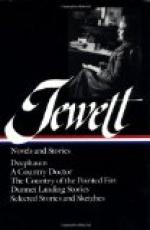We knew the coast-road would be bad after the fall rains, and we found that Leander, the eldest of the Dockum boys, had some errand that way, so he went with us. We enjoyed the drive that morning in spite of the rough road. The air was warm, and sweet with the smell of bayberry-bushes and pitch-pines and the delicious saltness of the sea, which was not far from us all the way. It was a perfect autumn day. Sometimes we crossed pebble beaches, and then went farther inland, through woods and up and down steep little hills; over shaky bridges which crossed narrow salt creeks in the marsh-lands. There was a little excitement about the drive, and an exhilaration in the air, and we laughed at jokes forgotten the next minute, and sang, and were jolly enough. Leander, who had never happened to see us in exactly this hilarious state of mind before, seemed surprised and interested, and became unusually talkative, telling us a great many edifying particulars about the people whose houses we passed, and who owned every wood-lot along the road. “Do you see that house over on the pi’nt?” he asked. “An old fellow lives there that’s part lost his mind. He had a son who was drowned off Cod Rock fishing, much as twenty-five years ago, and he’s worn a deep path out to the end of the pi’nt where he goes out every hand’s turn o’ the day to see if he can’t see the boat coming in.” And Leander looked round to see if we were not amused, and seemed puzzled because we didn’t laugh. Happily, his next story was funny.
We saw a sleepy little owl on the dead branch of a pine-tree; we saw a rabbit cross the road and disappear in a clump of juniper, and squirrels run up and down trees and along the stone-walls with acorns in their mouths. We passed straggling thickets of the upland sumach, leafless, and holding high their ungainly spikes of red berries; there were sturdy barberry-bushes along the lonely wayside, their unpicked fruit hanging in brilliant clusters. The blueberry-bushes made patches of dull red along the hillsides. The ferns were whitish-gray and brown at the edges of the woods, and the asters and golden-rods which had lately looked so gay in the open fields stood now in faded, frost-bitten companies. There were busy flocks of birds flitting from field to field, ready to start on their journey southward.
When we reached the house, to our surprise there was no one in sight and the place looked deserted. We left the wagon, and while Leander went toward the barn, which stood at a little distance, Kate and I went to the house and knocked. I opened the door a little way and said “Hallo!” but nobody answered. The people could not have moved away, for there were some chairs standing outside the door, and as I looked in I saw the bunches of herbs hanging up, and a trace of corn, and the furniture was all there. It was a great disappointment, for we had counted upon seeing the children again. Leander said there was nobody at the barn, and that they must have gone to a funeral; he couldn’t think of anything else.




